
Microsoft announces new app store principles, and they’re hoping that this new set of principles will bring them some peace with regulators after the huge acquisition of Activision Blizzard.
These new principles largely resemble the proposed Open App Markets Act, a new bill that has already been mentioned in the Senate. The ultimate goal is to treat apps equally within their store without prioritizing their own apps.
Those new principles will cover four key areas, as they include:
Quality, Safety, Security & Privacy
- We will enable all developers to access our app store as long as they meet reasonable and transparent standards for quality and safety.
- We will continue to protect the consumers and gamers who use our app store, ensuring that developers meet our standards for security.
- We will continue to respect the privacy of consumers in our app stores, giving them controls to manage their data and how it is used.
Accountability
- We will hold our own apps to the same standards we hold competing apps.
- We will not use any non-public information or data from our app store to compete with developers’ apps.
Fairness and Transparency
- We will treat apps equally in our app store without unreasonable preferencing or ranking of our apps or our business partners’ apps over others.
- We will be transparent about rules for promotion and marketing in our app store and apply these consistently and objectively.
Developer Choice
- We will not require developers in our app store to use our payment system to process in-app payments.
- We will not require developers in our app store to provide more favorable terms in our app store than in other app stores.
- We will not disadvantage developers if they choose to use a payment processing system other than ours or if they offer different terms and conditions in other app stores.
- We will not prevent developers from communicating directly with their customers through their apps for legitimate business purposes, such as pricing terms and product or service offerings.
A difference from their previously proposed principles is that developers won’t be required to use Microsoft’s in-app payments system on Windows.
Microsoft also confirmed that they are still committed to release popular Activision Blizzard games onto PlayStation platforms, though Bethesda has already seen Starfield become exclusive for PC and Xbox.
The ongoing Epic Games v. Apple lawsuit and its court hearings have shed some serious light to each company’s internal policies. While Epic Games has had an aggressive 12% cut for games published on their store, Microsoft finally matched that cut for their PC store as well. The company also considered making the same cut for Xbox Store releases.